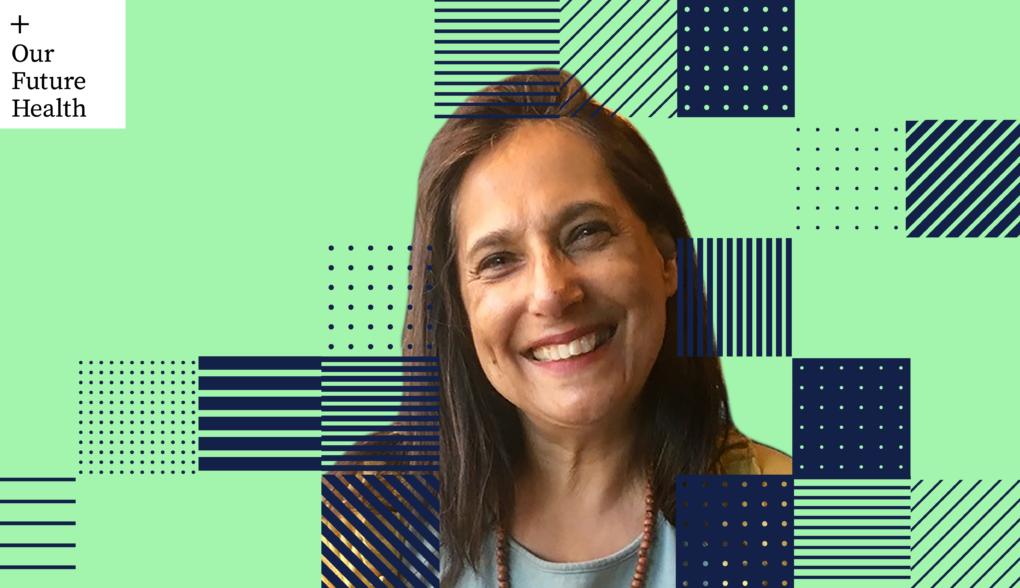‘I want to help people like me in the future’

On the surface, Renuka Baldwin’s reason for participating in Our Future Health is straightforward. “I joined knowing that it could help people like me in the future,” says the former art and design teacher who now runs a dressmaking business from her home in Suffolk. “I’m very supportive of helping the next generations.”
You don’t have to chat for long with Renuka to learn that there’s a real depth of feeling behind those words. It’s a depth of feeling that speaks of years of experience.
Life with colitis, life after cancer
Renuka has had a long and complicated health journey. Her symptoms started almost 30 years ago, when an early miscarriage triggered a flare up of ulcerative colitis, an auto-immune condition that causes inflammation and irritation within the lining of the colon. The condition is the result of the immune system’s overactive response.
“Once it gets a hold, it takes over my whole life. It’s vicious,” says Renuka, who continues to live with the disease today. “It’s very hard to treat, the steroid drugs I take have nasty side effects, so it feels like I have no control. My day-to-day routine changes, the fatigue and queasy feeling in my tummy is a constant reminder to be near a loo at all times.” During a flare-up, Renuka is forced to stay near her home for weeks. “It makes me go la-la,” she says matter-of-factly.
Renuka says that she’s learnt everything she can about her illness, as a coping mechanism. “Learning how to manage the symptoms has been key to understanding how to get past the fear”. She also takes part in health research, because “it’s a way to help others who go through similar experiences to me.”
She feels the same about cancer. Almost seven years ago, after a routine screening appointment, doctors discovered she had a ductal carcinoma, mercifully at an early stage. Treatment involved a lumpectomy and 15 gruelling rounds of radiotherapy. “It was such a shock. I’m so grateful to the NHS, which I believe saved my life,” she says. “Their screening programme caught my disease before it had the chance to progress. The prognosis was very positive.”
So, when Renuka says she is taking part in Our Future Health to help people like her, she’s speaking about everyone who might benefit from new research into colitis and cancer.
But she’s also talking about another group, too…
Health research’s diversity problem
“I describe myself as Anglo-Indian,” she says. “My father came to Britain when he was 23, in 1953. He got a scholarship to study Fine Art at Camberwell School of Arts and Crafts in London, where he met and fell in love with my English mother. At that time, interracial relationships were relatively rare.”
Renuka says she’s been aware of bias throughout her life, even as a child, when she was treated differently because of the colour of her skin. “Being mixed race and having to constantly defend my identity can be tiresome. I often wonder what it would be like if people could be less judgmental.”
Recently, she listened to an episode of the health podcast The Doctor’s Kitchen with Dr. Rupy Aujla, on the subject of bias in the medical profession. She learned that in the past, most research studies have not had enough representation from people of black, Asian and minority ethnic descent (the same applies to people who have lower incomes). It means that a lot of medical advances – from screening programmes to hospital care – may not benefit everyone equally.
Our Future Health will be different. We are building a database of up to five million volunteers that reflects the UK’s diverse population, so that researchers can identify differences in how diseases begin and progress in men and women from different backgrounds. Put simply, our group of volunteers must be truly diverse for our programme to succeed.
“I have it in my mind that people like me are needed by researchers,” says Renuka. “It’s important for people from mixed heritage backgrounds to take part. Research is extremely valuable for our young people, our kids, their future.”
The right to be curious
She has often wondered about the role her genetics have played in her ill health. “Is the colitis connected to my ethnicity? Which side of my family does it originate? Where did the cancer come from? I’ve always been curious about who I am and what makes me the person I have come to be. It makes me feel like I fit in when I understand.”
For Renuka, the phrase “be curious” just about sums up her philosophy in life. She says she’s learned to acknowledge biases by asking questions and being assertive – by making sure that she’s part of the conversation. It extends to her participation in health research too.
What would she say to anyone from a non-white background who’s considering volunteering for Our Future Health? Her reply is emphatic: “What you’re doing is not necessarily for the here and now, it’s for the future of our generations. It’s for our knowledge and understanding. Be curious.”
Read more of our Volunteer Voices
Volunteer Voices is a series that tells the stories behind Our Future Health participants. To read more, click the links below.
- Joanne Foden: ‘I wouldn’t be here without the NHS – I wanted to give something back’
- Paul Hooley: ‘Joining Our Future Health is like leaving your body to science – while you’re still alive’
Would you like to be featured in Volunteer Voices? Get in contact with us by emailing stories@ourfuturehealth.org.uk. Everyone has something unique to give.